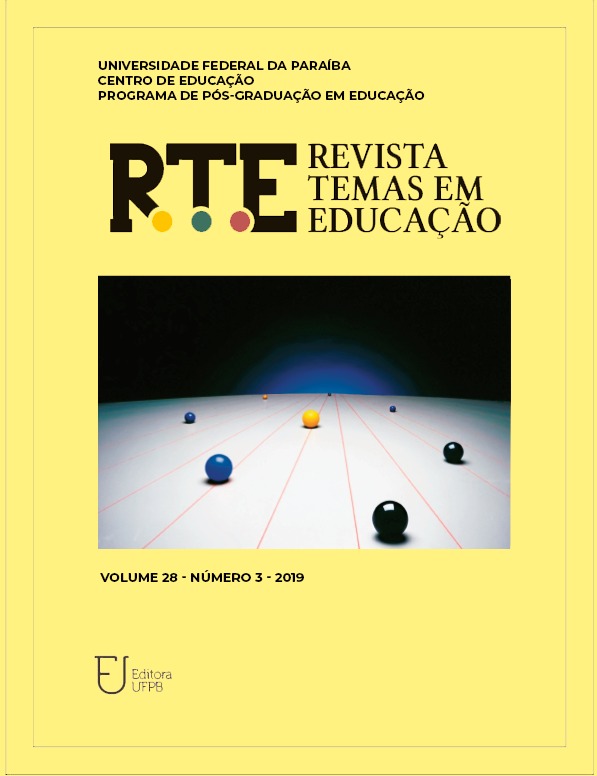THE FORMATIVE SPACE OF THE PIBID AS LOCUS OF DESTABILIZATION AND EX-POSITIONS ON ISSUES OF GENDER AND SEXUALITY
THE FORMATIVE SPACE OF THE PIBID AS LOCUS OF DESTABILIZATION AND EX-POSITIONS ON ISSUES OF GENDER AND SEXUALITY
DOI:
https://doi.org/10.22478/ufpb.2359-7003.2019v28n3.48043Keywords:
Teacher education, Gender relations, Sexuality, PIBID programAbstract
This article narrates and discusses some scenes built during an intervention-research developed through of the formative meetings with a group of educators, undergraduates and a professor participants of an early childhood education project (nursery) of the Institutional Program to Teaching Initiation (Programa Institucional de Bolsa de Iniciação à Docência –PIBID) of a federal university in Minas Gerais. The debated themes of the formative moments have focused on gender and sexuality relations and were discussed in six meetings with the class. The provocations, concerns and anxieties associated with questions on sexuality of the children captured the thoughts of the participants who brought up the dilemma between lack of knowledge and super-knowledge. The episodes emerged, in general, from unpredictable situations that occur in the school context, mobilizing knowledge on gender and sexuality produced during the initial and continuing education of the participants. The space of the PIBID developed at the university also enhanced the expression of these scenes, because the participants recognized it as a place of destabilization, expositions and investment in their training.
Downloads
References
AGUIAR, K. F.; ROCHA, M. L. Micropolítica e o exercício da pesquisa-intervenção: referenciais e dispositivos de análise. Psicologia Ciência e Profissão, v. 27, n. 4, p. 648-663, 2007.
BRASIL. Conselho Nacional de Combate à Discriminação. Brasil Sem Homofobia: Programa de combate à violência e à discriminação contra GLTB e promoção da cidadania homossexual. Brasília: Ministério da Saúde, 2004.
BRASIL. Presidência da República. Decreto n° 7.219, de 24 de junho de 2010. Dispõe sobre o Programa Institucional de Bolsa de Iniciação à Docência - PIBID e dá outras providências. D. O. U. de 25/06/2010.
FELIPE, J. Infância, gênero e sexualidade. Educação e Realidade, v. 25, n. 1, p. 115-131, jan./jun., 2000.
FELIPE, J.; GUIZZO, B. S. Entre batons, esmaltes e fantasias. In: MEYER, D. E.; SOARES, R. F. R. (orgs.). Corpo, gênero e sexualidade. Porto Alegre: Mediação, 2004, p. 31-40.
FERRARI, A.; FRANCO, E. “Lidando com as homossexualidades” – a formação de professores em debate. Instrumento: Revista de Estudo e Pesquisa em Educação. Juiz de Fora, v. 12, n. 2, p. 9-20, jul./dez. 2010.
FOUCAULT, M. Microfísica do poder. Rio de Janeiro: Edições Graal, 1979.
FOUCAULT, M. História da sexualidade I: a vontade de saber. Rio de Janeiro: Edições Graal, 1988.
FOUCAULT, M. “Sexualidade e Poder”, In: FOUCAULT, Michel. Ética, sexualidade e poder. Rio de Janeiro: Forense Universitária, 2006, p. 56-76.
LARROSA, J. Tremores: escritos sobre experiência. Belo Horizonte: Autêntica Editora, 2014.
LOURO, G. L. (org). O corpo educado: pedagogias da sexualidade. 2 ed. Belo Horizonte: Autêntica, 2000.
LOURO, G. L. Um corpo estranho – ensaios sobre sexualidade e teoria queer. 1 ed. 1 reimp. Belo Horizonte: Autêntica, 2008.
MEYER, D. E. E.; SOARES, R. F. Modos de ver e de se movimentar pelos “caminhos” da pesquisa pós-estruturalista em Educação: o que podemos aprender com – e a partir de – um filme. In: COSTA, M. V.; BUJES, M. I. E. (org.). Caminhos investigativos III: riscos e possibilidades de pesquisar nas fronteiras. Rio de Janeiro: DP&A, 2005, p. 23-44.
ROHDEN, F. Gênero, sexualidade e raça/etnia: desafios transversais na formação do professor. Cadernos de Pesquisa, v. 39, n. 136, p.157-174, jan./abr., 2009.
SCHINDHELM, V. G. A sexualidade na educação infantil. RevistAleph, ano V, n. 16, p. 35-47, dez., 2011.
Downloads
Published
How to Cite
Issue
Section
License
Authors who publish in this journal agree to the following terms:
. Authors retain the copyright and grant the journal the right to first publication, with the work simultaneously licensed under the Licença Creative Commons Attribution that allows the sharing of the work with acknowledgment of authorship and initial publication in this magazine. . Authors are authorized to assume additional contracts separately, for non-exclusive distribution of the version of the work published in this journal (eg, publishing in institutional repository or as a book chapter), with acknowledgment of authorship and initial publication in this journal.
. Authors are permitted and encouraged to publish and distribute their work online (eg in institutional repositories or on their personal page) at any point before or during the editorial process, as this can generate productive changes, as well as increase impact and citation of the published work (See O Efeito do Acesso Livre).



















